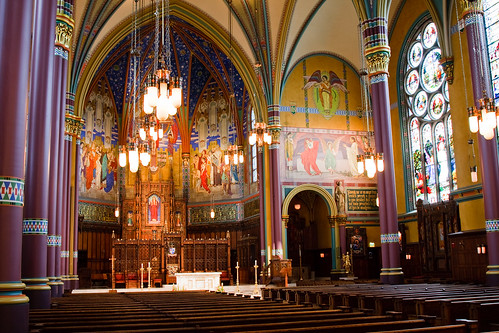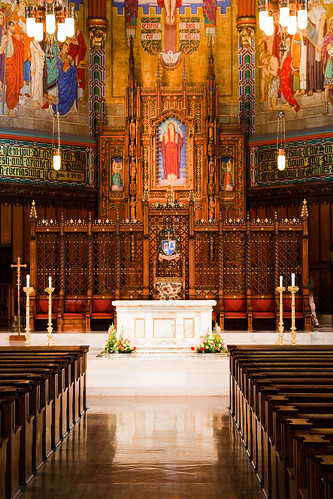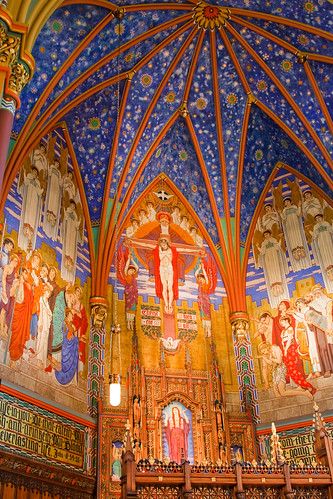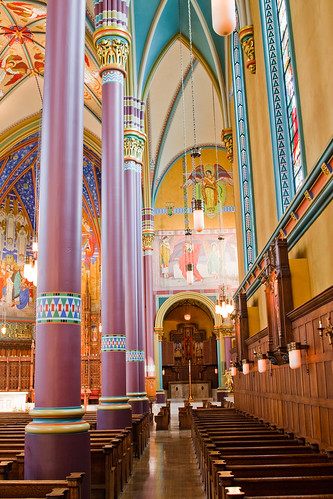In response to many requests, Msgr. Wadsworth has made available his homily for the Ember Day Mass.
A Homily for the Ember Saturday in the Octave of Pentecost
Preached by Msgr Andrew Wadsworth at a Solemn High in the Church of the Epiphany, Pittsburgh at the Colloquium XXI of The Church Music Association of America
June 18 2011From the text of the Introit, and indeed the Epistle of this Holy Mass: Caritas Dei diffusa est in cordibus nostris (The love of God is poured forth in our hearts.)
Pentecost, as we know, is the culmination of the Easter festival, which, my breviary informs me, ends today after the office of None. The feast of Pentecost and its octave explains to us how the power of the mystery of Jesus, the mystery of Christ’s suffering, dying and rising is communicated and received; communicated by God, and received by us. God’s plan of salvation is, shall we say, expressed in summary form in the breath-taking readings of today’s Mass.If a person were to walk in from the street, and one knowing nothing of the Faith that we hold, if that person were enlightened by the Holy Spirit to understand what they were witnessing at this Mass, just about the whole truth of the Catholic faith is laid before them. Today’s great feature is the distinctive sequence of prophecies, alleluias and collects of this Ember Day Mass. Our faith is made so much clearer to us; for we hear of the pouring out of the Holy Spirit (Joel 2,28-32); we hear of the harvest which God expects (Lev 23, 9-11;15-17;21); we hear of the possession of the land (Deut 26,1-11) and the fruitfulness of that land (Lev 26,3-12); and we hear, finally, of the purification by fire, which is the suffering and the trial through which we must all pass (Dan 3, 47-51).
In today’s great Epistle (Rom 5,1-5) we hear that we have, through God’s great mercy, access through faith in Christ, to grace. And then, the Gospel we’ve just heard (Luke 4,38-44) tells us how that grace is put to work, by God, in our hearts, to heal us. In this, Simon’s mother in law is a picture of the Church. This morning at Matins, St Ambrose in his wonderful homily commenting on the Gospel, makes it clear that the fever of Simon’s mother-in-law is an expression of the weakness and the vulnerability that we know so well.
He says, Febris enim nostra, avaritia est : febris nostra, libido est : febris nostra, luxuria est : febris nostra, ambitio est : febris nostra, iracundia est (Homily by St Ambrose, Book. iv. on Luke 4). Our fever, the weakness which so easily and obviously besets us, is that avarice or lack of generosity, lust, selfishness or greed, ambition and anger. These are the things in the human heart which keep us from God and one another. They are impediments to the action of the Holy Spirit and they are very real impediments to God’s plan.
What is that plan? The Fathers of the Church called it nothing less than divinization, the process of expanding the human heart so much that eventually it can receive God Himself. Scripture says: “when we see Him, we shall be like Him” (1John 3, 2-3). I’m sure I don’t only speak for myself when I say that we are all very much a work in process – the process whereby a heart becomes sufficiently generous to receive God Himself.
God has given us this great promise which we hear at the heart of this Mass, the song which is on the lips of the Church as this Mass begins: the Love of God is being poured forth in our hearts. It points us toward heaven, just as the liturgy does. It points us towards the goal, as it were, to which this procession must move.
Today, in our tradition, is a great day for the pouring out of the Holy Spirit in the gift of ordination, the ordinations to the minor orders, and even to the major orders, culminating in the ordination to the priesthood just before the Gospel. We can see how, in God’s providence, and in His plan, this priestly people which makes up the Catholic Church, should, through the celebration of the Sacred Liturgy, expand its heart to receive God Himself.
We know, do we not, that it is in the liturgy, at its best, that maybe just for a brief moment, the veil is lifted? And we perceive, even in this life, something which is the life of heaven, which breaks through, into our hearts. It is principally in the liturgy that we learn the language of heaven, and the song of heaven.
We are told that the Fathers of the Church learnt the chant from the angels, and that our singing altera ad alterum, antiphonally from side to side, is an imitation of the choirs of angels that sing responding to one another. When we sing, we should be like them, because we shall have become what we sing: Sanctus, sanctus, sanctus. Holy, holy, holy…




